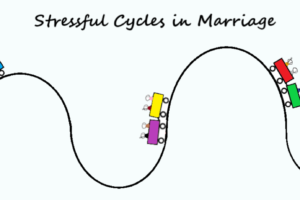What is Gray Rocking?
The introduction of the term gray rocking is often credited to a 2012 article on the website LoveFraud.com. According to the writer, Skylar, the name gray rocking came from the most boring, uninteresting thing they could think of (a gray rock). https://www.dictionary.com/e/pop-culture/gray-rocking/
Gray rocking is a tactic that can be used with abusive, manipulative, narcissistic or toxic people. When someone’s behavior is offensive, if you are using the technique of gray rocking, you would become as uninteresting and unengaged as possible. If you show little or no reaction and/or little or no emotion, the toxic person won’t get the thrill or “enjoyment” in the performance of their harmful or destructive behavior.
Ideally the other person loses interest, stops their destructive behavior and eventually just goes away. Refusing to give the abusive, manipulative, narcissistic or toxic person their desired reaction makes your interactions with this person less rewarding.
The Effectiveness of Gray Rocking
Gray rocking is similar to the behavioral psychological theory of extinction. Extinction occurs when a behavior occurs and it does not get the desired effect. Eventually the person will stop doing the behavior. For example, when a partner, parent, child, co-worker or supervisor exhibits toxic or narcissistic behavior, instead of responding to it in a flight, fight, freeze, frenzy or fawning manner, you withdraw all emotional and physical reactions and/or responses.
You don’t respond at all.
No published research has assessed how well the gray rock method works, whether it reduces abuse, or how it affects the behavior of abusive people. As a result, it is hard to know whether it reliably works or is safe.
What gray rocking may do is allow the person who is using the technique to more effectively detach themselves from a toxic person.
For some toxic and/or narcissistic people, gray rocking only inflames the situation and makes it worse. It is not a technique to be used lightly.
The Difference Between Gray Rocking and Withdrawal
Gray rocking is a deliberate action. It is a technique to extinguish abusive or harmful behavior by a toxic individual.
Withdrawal or isolation is a more automatic reaction to that same abusive or toxic behavior.
The Risks of Gray Rocking
If you have a close association with a toxic person, you may have tried a variety of techniques to be in the same space with this person:
- You may be in an intimate relationship and choose to stay in the relationship.
- It may be a family member that you are compelled to have some regular contact with.
- The toxic person may be your co-worker or your boss, and it is a job you want/need to keep.
As with any technique there are risks. Gray rocking is no different. Risks include:
- Instead of backing down, the toxic person may escalate their bad behavior.
- It can be emotionally draining because it must be done consistently to be effective.
- The person doing the gray rocking may end up shutting down in other situations with other people as well as with the toxic person.
When to use Gray Rocking
Gray rocking is not a solution to toxic behavior. It is a temporary fix that may give you more time to prepare to leave the relationship, find a new job, develop and enforce stronger boundaries or to just make a plan that does not suck your emotions dry.
Some techniques a person might use when grey rocking include:
- giving short, noncommittal, or one-word answers
- keeping interactions short
- avoiding arguing, no matter what someone says or does
- keeping personal or sensitive information private
- showing no emotion or vulnerability
- minimizing contact, such as by waiting long periods of time before responding to texts or leaving a call as quickly as possible
Your use of gray rocking will look different with different people. For example:
- With your significant other you avoid arguing at all costs. You consistently show no sign of emotions or vulnerability.
- With your Aunt Shelly at Thanksgiving, you minimize your contact by arriving late and leaving early.
- With your co-worker, Jack, who always takes credit for every project, you give quick, short, noncommittal answers.
The specific approach a person uses may vary depending on the situation.
If Not Gray Rocking, What?
Gray rocking is not the only technique to use with toxic people. It is just one. Other ideas might include:
- practicing positive self-talk and self-compassion
- taking time for yourself
- talking with trusted family or friends
- creating a quiet space where you can feel safe
- spending time with supportive, loving people
- joining a support group
- developing a safety plan or an exit plan for the relationship or the job
- seeking help from a supportive therapist or counselor
Relationships Relearned: Learn. Unlearn. Relearn
To be in a healthy, successful relationship, what you learned in childhood about relationships may need to be unlearned and relearned in a different way as an adult.
In childhood, you may have learned how to fight, flight, freeze, frenzy or fawn as a reaction to toxic behavior from someone else. While those techniques may have served you well as a child or teenager, by adulthood you may have realized those techniques weren’t always the most effective.
You may have to unlearn those reactions and learn other skills that are more deliberate, like gray rocking. It may not be the best or most effective technique if you are in an abusive relationship, but it may buy you time until you can come up with a safety plan.
Take Away
Gray rocking may be a technique to use if you are in a relationship with a toxic, narcissistic individual or work with, or for, someone who is toxic.
With warmest regards,
Warning: If you are in a domestically abusive relationship, the technique of gray rocking may not be physically, emotionally or sexually safe for you to attempt. The abusive person may retaliate. If you are concerned for your emotional and/or physical safety, and it is safe to do, please contact your local resource center for victims of domestic abuse or the National Domestic Violence Hotline at 800-799-7233. Someone is available 24/7.
| AI has not been used to create any content for my website, articles, blogs or books. All material is original unless otherwise noted. All photos and graphics within my website and blogs were taken or created by David Harrington or Kathryn Maietta. |
Thank you so much for reading this blog. If you enjoyed the content, please check out my other blog at:
https://rvingnomads.com/blog/
In addition to blogs and articles, I have written a series of self-help books. To view these books, please go to my Amazon Authors Page or go to the books tab at the top of this page.
To be notified of future posts, please enter your email address and click on the Subscribe button.











